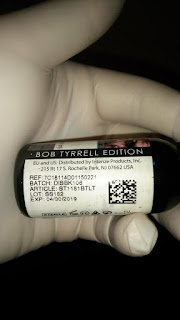Does tattoo ink really expire?
-Mike
The answer is both yes and no, but more yes than no.
Ink is simply a pigment (heavy metals, oxidized metals, plastics, or other materials), mixed with a carrier fluid (usually an alcohol like ethyl alcohol or glycerin and/or distilled water). The majority of tattooers use pre-dispersed ink (pigment that has been mixed with a carrier, or is wet) sold by a trusted manufacturer. A few tattooers mix their ink themselves. Materials are selected based on what will produce the brightest possible and longest lasting color, what is least likely to induce a severe reaction in the body (all materials produce a reaction, resulting in the permanence of the tattoo), what will most easily and evenly go into the skin, and what will be cost-effective to produce.
 |
| Expiration Date on Eternal Ink |
Technically, inorganic pigment materials have no expiration. The carrier fluid will eventually evaporate in most ink-bottles. The plastic of the bottle and seals will break down enough in time to allow the evaporated fluid to escape. In theory, adding more carrier fluid to a bottle of ink that has dried out would result in usable dispersed ink.
But, that is not the way to go.
Tattoo inks are regulated by the FDA, but it is a regulation that is rarely exercised. This is because the Tattoo Industry has become very good at self-regulation. The "shelf-life" of tattoo ink is often around two years, with most tattoo studios using up more common colors well before the expiration date. The best-practice in reputable shops is to throw expired ink away.
The idea of recharging a dried-out bottle of ink may be one considered for monetary reasons. After all, tattoo ink is one of the most expensive fluids on the market. On average, a one ounce bottle of premium tattoo ink costs between $8-$10. For the sake of comparison, an ounce of petroleum for your car is about $.02. At the time of this writing, an ounce of silver (the precious metal, not silver ink) is about $15. Again, despite the cost of ink, "recharging" is not the way to go. Studios that do mix their own ink do not do so for monetary reasons, but rather to have greater control of the color selection and quality (disbursement, longevity) of their ink.
While the materials in tattoo ink do not technically expire, they can become contaminated. Assuming that the ink was bottled and sealed in a sterile environment (which may not be the case with some ink manufacturers), ink is exposed to contaminants as soon as the seal is broken. While the rate of contamination is slight with a bottle that remains capped when not in use, the longer the bottle sits the more contaminants it potentially contains. When fluid is lost from the bottle, by pouring ink from it for use or due to evaporation, air from the environment replaces the volume of fluid lost. In the average tattoo studio, that is air which has been in the lungs of several people and has been contaminated by blood-plasma and other organic particles that result from the tattoo process.
 |
| Expiration Date on Intenze |
The expiration date, while arbitrarily determined based on the shelf life of the container and in order to prevent external regulation as well as meet local health-codes governing the tattoo industry, serves as an excellent guide to help minimize the possibility of contamination placing a client at risk. Though the risk is extremely slight, anything we can do to reduce the risk is better for our clients and the industry as a whole. You are best served purchasing ink from manufacturers that use expiration dates, by checking your bottles on a monthly basis, and re-ordering inks that are about the expire in what is hopefully the rare time when an exotic ink nears the end of its shelf life.
As an addendum, the best way to know what is a reputable source of ink is to take a look at a few tattoo studios in your area. Tattoo studios, to stay competitive, quickly move to new products or techniques if it appears that those products give another studio or artist an advantage. If you don't see your ink (or the ink of your tattooer) being commonly used in other studios, it is best to ask why. Cheap inks cause more problems than they solve.
Jason Sorrell is a writer, tattoo artist, satirist, artist, and generally nice guy living in Austin, TX. He loves answering questions about tattoos. Shoot him an email at https://www.facebook.com/tattoonerdz/

